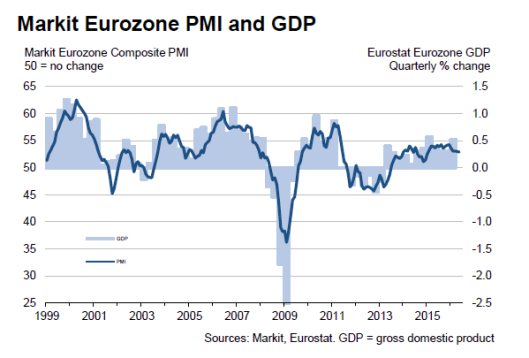Markit reported on three key manufacturing surveys today: Japan, US, and Eurozone.
This article puts a spotlight on the Eurozone report in the wake of record stimulus by ECB president Mario Draghi.
Markit reports Flash Eurozone PMIEdges Down to 16-Month Low.
Key Points
Flash Eurozone PMI Composite Output Index at 52.9 (53.0 in April). 16-month low.
Flash Eurozone Services PMI Activity Index at 53.1 (53.1 in April). Unchanged.
Flash Eurozone Manufacturing PMI at 51.5 (51.7 in April). 3-month low.
Flash Eurozone Manufacturing PMI Output Index at 52.4 (52.6 in April). 3-month low.
The May Flash PMI reinforced the picture of subdued growth of eurozone economic activity, with few signs of any imminent improvement.
The Markit Flash Eurozone PMI – which is based on approximately 85-90% of normal final monthly replies – slipped to a 16-month low of 52.9 in May, down from 53.0 in April. With the PMI having averaged 53.2 in the opening quarter, the latest two months’ weak data suggest that economic growth has likely slowed in the second quarter.
With new business growth also sliding to the lowest since January 2015, the survey data point to a strong likelihood of output growth remaining subdued or even weakening further in June.

Markit Chief Economist Chris Williamson’s Comments
“A disappointing flash eurozone PMI for May adds further to the suggestion that the robust pace of economic growth seen in the first quarter will prove temporary. The PMI is signalling lacklustre GDP growth of only 0.3% in the second quarter.”
“The forward-looking indicators also suggest that growth is more likely to weaken further than accelerate. Inflows of new work showed the smallest rise for nearly a year-and-a-half, while optimism about the business outlook in the service sector sank to its lowest since July 2015.”
“There are signs of improving life in the ‘core’ countries of France and Germany, led mainly by their service sectors, as manufacturing continued to struggle. However, elsewhere the rate of expansion slowed to its weakest for almost one-and-a-half years.”
“The survey therefore paints a picture of a region stuck in a low-growth phase, managing to eke out frustratingly modest output and employment gains despite various ECB stimulus ‘bazookas’, a competitive exchange rate and households benefiting from falling prices.”












Leave A Comment